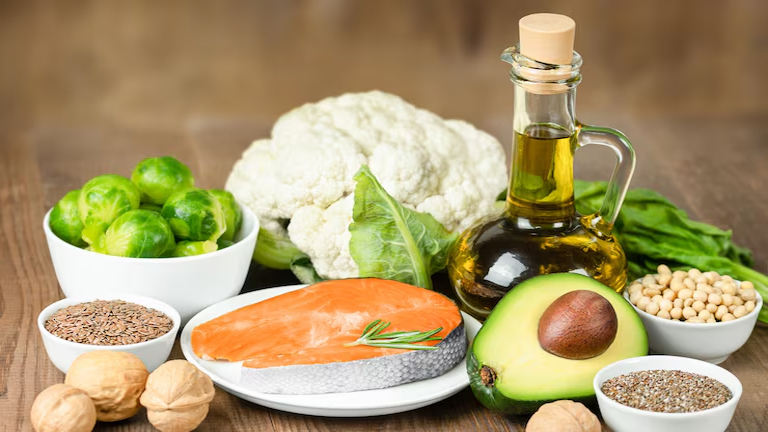Chronic inflammation is linked to numerous health issues, including heart disease, diabetes, and autoimmune disorders. An anti-inflammatory diet can help combat inflammation naturally, promoting overall well-being. This comprehensive guide explores the best foods, meal plans, and lifestyle tips to reduce inflammation effectively.
What Is an Anti-Inflammatory Diet?
An anti-inflammatory diet focuses on consuming whole, nutrient-dense foods that help reduce chronic inflammation. Unlike processed foods that trigger inflammation, this diet emphasizes:
- Antioxidant-rich fruits and vegetables
- Healthy fats (like omega-3 fatty acids)
- Lean proteins (such as fish and legumes)
- Whole grains and fiber
By avoiding sugar, refined carbs, and trans fats, this diet supports immune function and lowers disease risk.
Top Anti-Inflammatory Foods to Include
1. Fatty Fish (Rich in Omega-3s)
Salmon, mackerel, and sardines are packed with omega-3 fatty acids, which reduce inflammatory markers like C-reactive protein (CRP).
2. Leafy Greens
Spinach, kale, and Swiss chard contain flavonoids and vitamins A, C, and K, which fight oxidative stress.
3. Berries (Antioxidant Powerhouses)
Blueberries, strawberries, and raspberries are high in anthocyanins, compounds that lower inflammation.
4. Nuts and Seeds
Almonds, walnuts, chia seeds, and flaxseeds provide healthy fats and fiber, reducing inflammatory responses.
5. Olive Oil (Extra Virgin)
A staple of the Mediterranean diet, olive oil contains oleocanthal, a natural anti-inflammatory compound.
6. Turmeric and Ginger
Turmeric’s curcumin and ginger’s gingerol are potent anti-inflammatory agents.
Foods That Cause Inflammation (Avoid These!)
To maximize the benefits of an anti-inflammatory diet, limit or avoid:
- Processed sugars (sodas, candies, pastries)
- Refined carbs (white bread, pasta, pastries)
- Trans fats (fried foods, margarine)
- Excessive alcohol
- Processed meats (sausages, bacon, deli meats)
These foods trigger pro-inflammatory cytokines, worsening chronic inflammation.
7-Day Anti-Inflammatory Meal Plan
Day 1
- Breakfast: Oatmeal with blueberries and walnuts
- Lunch: Grilled salmon with quinoa and steamed broccoli
- Dinner: Lentil soup with a side of kale salad
Day 2
- Breakfast: Smoothie with spinach, banana, chia seeds, and almond milk
- Lunch: Chickpea and avocado wrap with turmeric dressing
- Dinner: Baked chicken with sweet potatoes and asparagus
*(Continue with 5 more days of balanced meals incorporating anti-inflammatory foods.)*
Lifestyle Tips to Enhance Anti-Inflammatory Effects
1. Stay Hydrated
Water helps flush out toxins that contribute to inflammation.
2. Exercise Regularly
Moderate exercise reduces inflammatory markers and boosts circulation.
3. Manage Stress
Chronic stress increases cortisol, worsening inflammation. Try yoga, meditation, or deep breathing.
4. Get Enough Sleep
Poor sleep disrupts immune function, leading to higher inflammation. Aim for 7-9 hours per night.
Anti-Inflammatory vs. Pro-Inflammatory Foods
| Category | Anti-Inflammatory Foods (Eat More) | Pro-Inflammatory Foods (Avoid/Limit) |
| Fruits | Berries (blueberries, strawberries), Cherries, Oranges | Sugary fruits (canned in syrup), Excessive dried fruits with added sugar |
| Vegetables | Spinach, Kale, Broccoli, Brussels Sprouts | Fried vegetables, Creamy canned veggies |
| Proteins | Fatty fish (salmon, sardines), Lentils, Chickpeas | Processed meats (bacon, sausages), Fried meats |
| Fats & Oils | Extra virgin olive oil, Avocados, Nuts (walnuts, almonds) | Trans fats (margarine, shortening), Vegetable oils (soybean, corn oil) |
| Grains | Quinoa, Brown rice, Oats | White bread, Pastries, Refined pasta |
| Dairy | Greek yogurt, Kefir (unsweetened) | Full-fat processed cheese, Ice cream |
| Beverages | Green tea, Herbal teas, Water | Sugary sodas, Excessive alcohol, Energy drinks |
| Spices & Herbs | Turmeric, Ginger, Garlic | Excessive salt, Artificial flavorings |
Scientific Evidence Supporting Anti-Inflammatory Diets
Studies show that:
- The Mediterranean diet reduces CRP levels (a key inflammation marker).
- Omega-3s from fish lower the risk of heart disease by reducing arterial inflammation.
- Polyphenols in green tea and dark chocolate decrease oxidative stress.
Final Thoughts
An anti-inflammatory diet is not just a temporary fix—it’s a sustainable way to improve long-term health. By incorporating whole foods, healthy fats, and antioxidants, you can naturally reduce inflammation and lower disease risk. Start with small dietary changes, follow the meal plan, and combine it with a healthy lifestyle for optimal results.
Would you like a customized anti-inflammatory shopping list? Let us know in the comments!


